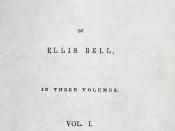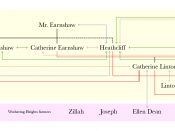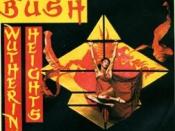Emily Bronte has only written one novel due to her short tragic life, this was Wuthering Heights, and it was first published in December 1847. She also wrote a lot of poetry, which was published in May 1948 alongside her sister's in "Poems by Currer, Ellis and Acton Bell". Wuthering Heights was "met with" mixed reviews and "hardly" any "success" (Knoepflmacher, 1). Even Emily's own sister Charlotte was critical about the novel, saying in the preface to the second edition which was published in 1850; "I have just read over Wuthering Heights and for the first time have obtained a clear glimpse of ⦠its faults" (Charlotte Bronte, Wuthering Heights, 324). Charlotte then goes on to say, "it is out of my power to apologize" (Charlotte Bronte, Wuthering Heights, 325). The readers could take this to mean that Charlotte felt obliged to apologise for her sister's novel however, as it was not her novel, she was unable to do so.
Nevertheless, Charlotte's degrading view on her younger sisters novel did not influence future generations of readers but did reflect the view of the novel at the time. Now days Wuthering Heights is seen to be one of the most popular and highly regarded novels in English Literature.
To explain love and to give it a meaningful definition seems to be impossible. However, the Bible over the centuries has taught its readers the three different types of love. The first example is 'Eros' also known as 'erotic love'. it is based on strong feelings between two people. The weakness with this type of love is that it is based more on 'self-benefit' of what can benefit you rather than the other person. This is "I love you because it feels good and makes me happy loving you". The second type of love is a love based on "give and take", where two people benefit in a mutual way. It is called Philos, it takes time to reach this state of love but the strong emotions appear suddenly and passionately. The third and highest form of love is 'Agape', or also known as unconditional love. Agape love is above Philos and Eros love. It is a love that is very selfless, where a person gives out love to another person even if this act does not benefit her/him in any way. Whether the love is returned or not, the person continues to love (even without any self-benefit). However, the Bible teaches, the highest type of all love is not human but divine. It is God's unconditional love for us, his children.
Freud looked at the love Eros throughout his working career, he also wrote about it in several of his books. Such as, "Group Psychology and the analysis of the Ego" (1921) and "The Ego and the Id" (1923). His main thoughts on Eros are summarised by David Mann who is a member of the London Centre for Psychotherapy. He sums up Freud's different and opposing views on "Eros" are that "Eros clamours, holds together, unites, binds, preserves, lives, loves, is a parent, complicates and creates mischief." (Mann, 17). It is the idea that Eros "complicates and creates mischief" which will be discussed in reference to Wuthering Heights. It is the love between Heathcliff and Cathy, which "creates mischief" and is the driving force in the novel. Yet it is the same love between the same two characters, which is destroyed by their own personal flaws.
Heathcliff is the main protagonist throughout the novel. It is from losing his love with Cathy that his character and persona becomes demonised. Heathcliff over hears Cathy telling Nelly that she could not marry him as it would socially and intellectually degrade her. "It would degrade me to marry Heathcliff" (Emily Bronte, Wuthering Heights, 71). Heathcliff then subsequently leaves Wuthering Heights for five years and by the time, he has returned Cathy has married Edgar Linton. It is because of this Heathcliff decides to take revenge. He begins by destroying Hindley. In the 1998, film directed by David Skynner it is shown that Heathcliff gave Hindley his first drink, which lead him on the downward slide to becoming an alcoholic. Nevertheless this is not the case in the novel, it only says that Heathcliff "delighted to witness Hindley degrading himself past redemption; and become daily more notable for savage sullenness and ferocity" (Emily Bronte, Wuthering Heights, 58). At one point Heathcliff even kicks and tramples on Hindley.
In David Mann's book In Search Of Love and Hate, he looks into why people replace the emotion of love with the emotion of hate. He says, "love can close down psychological distance between individuals and, therefore, can be experienced as a threat to a fragile sense of self" (Mann, 35). Catherine or Heathcliff could have felt this "threat" due to growing up and falling in love in such close proximity. David Mann then goes on to explain the emotion of hate. He says; "Hate, on the other hand, creates more distance and effects barriers against potentially destructive nature of intimate contact with each other" (Mann, 35). This could be justified in that Heathcliff and Catherine's love was "destructive" when they were in "intimate contact with each other". Heathcliff then continues to demonise himself by seeking revenge on Edgar Linton. He does this as Edgar has the one thing Heathcliff loves, Catherine. Earlier on in the novel during the conversation between Catherine and Nelly if Heathcliff had stayed to listen to the rest of the conversation he would have heard Catherine exclaim her undying love for him by disclosing; "my love for Heathcliff resembles the eternal rocks beneathâ¦I am Heathcliff" (Emily Bronte, Wuthering Heights, 73).
Catherine's love for Heathcliff is of the selfish type of love, "Eros". She wants to be able to gain self-benefits from being in love. From marrying Edgar, she gains a higher place in society and a home at Thrushcross Grange. Although, negatively she does not marry the man she truly loves which, would have been the right thing to do. I believe this is because Heathcliff and Catherine do not get past the stage of "Eros" love. If they had reached the point of "Philos" or "Agape" then perhaps the novel would have a different ending. To go back to Freud's idea of "Eros", as the "mischief maker" (Mann, 17) Freud states, "Perhaps that might be to undervalue the part played by Eros" (Mann, 21). This can be related to the story in Wuthering Heights as if Heathcliff and Catherine (senior) had married then there would have been no Catherine (junior). Thus, there would have been no successful conclusion for Hareton Earnshaw and Catherine (junior). Through Catherine and Heathcliff's "loved and lost", a truer and deeper love developed and formed between the next generations.
It is through this love, which the story comes full circle and peace is restored to how it was at the beginning of the novel. This is done quite simply through the surnames of the two Catherine's. Catherine (senior) was born an Earnshaw, if she had married Heathcliff than she would have taken his surname and become Catherine Heathcliff; instead, she married Edgar thus becoming Catherine Linton. She then gave birth to a daughter of the same name. Catherine Linton (junior) is tricked into marriage with Heathcliff's son, Linton Heathcliff. Now Catherine (juniors) name is now Catherine Heathcliff exactly what her mother's name would have been if she had married Heathcliff. For Heathcliff his revenge is now complete. Once Edgar and Linton die he gains control of Thrushcross Grange and its surrounding land. In spite of this, after her father in law's death, Catherine (junior) goes onto marry Hareton Earnshaw. Thus making the circle complete and peace restored in the novel by becoming Catherine Earnshaw; her mother's maiden name.
Therefore, in conclusion, the novel Wuthering Heights has opposing views on the Tennyson quote "Tis better to have loved and lost/Than never to have loved at all" (Tennyson). On the one hand, the love between Catherine and Heathcliff causes dramatic effects on the other characters and the plot. It also causes Heathcliff's persona to become demonised and seek revenge on the Earnshaw and Linton families. Yet on the other hand, if Heathcliff and Catherine's love had been successful; then the second generation in the novel would never have a love that is truer, deeper and equal, in comparison to the first generation. The marriage between Cathy and Hareton brings closure to the novel through Cathy returning to her mother's maiden name, Catherine Earnshaw. This brings the novel full circle and gives its reader a sense of completion within the story. The possible main reason for Catherine and Heathcliff's love being lost is that their love was of the selfish kind "Eros". In addition, never made it to the "Philos" or "agape" forms of love. In spite of that, it can be argued that Catherine and Hareton did reach one of those stages, as their love was perpetual and undying.
BibliographyBronte, Emily. (1995). Wuthering Heights. Oxford: Oxford World Classics.
Knoepflmacher, U.C. (1989). Wuthering Hieghts, A Study. Cambridge: Cambridge University press.
Mann, David. (2002). Love and Hate. Sussex: Brunner and Routledge.
Pines, Ayala Malach. (2005). Falling In Love. Sussex: Routledge.
Sherrard, Philip. (1976). Christianity and Eros. Surrey: Unwin Brothers Limited.






